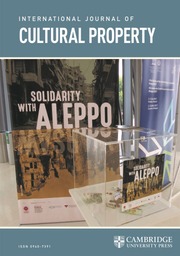Between 17 and 19 September 2012, a capacity-building and awareness-raising workshop on the fight against illicit trafficking in cultural property in West Africa was held at UNESCO-BREDA (BREDA is UNESCO Regional Bureau for Education in Africa) office in Dakar, Senegal. The principal aim of the workshop was to assess the current situation of the institutional framework with regard to preventing and combating trafficking in cultural property nationally and in the subregion and to identifying ways of strengthening cooperation among the countries on the basis of the UNESCO 1970 Convention on the Means of Prohibiting and Preventing the Illicit Import, Export and Transfer of Ownership of Cultural Property, and the 1995 UNIDROIT Convention on Stolen or Illegally Exported Cultural Objects. Representatives of 14 African countries (Benin, Burkina Faso, Cape Verde, Cote d’Ivore, Gambia, Ghana, Guinea, Guinea-Bissau, Liberia, Mali, Niger, Nigeria, Senegal, and Togo) participated in the workshop. In addition, representatives of UNESCO’s three partner institutions—Ecole du Patrimoine Africain (EPA), Interpol, and UNIDROIT—also contributed to the proceedings. The workshop was declared open by Youssou Ndour, Minister of Culture and Tourism of Senegal.
In the first session after the opening ceremony, the international dimension of the fight against illicit trafficking was covered. The utility of the various international instruments such as the 1970 UNESCO Convention, the UNIDROIT Convention of 1995, and the 1954 Hague Convention for Protection of Cultural Property and its two Protocols were explored. Thereafter, the state of national legislation for the protection of cultural property in the subregion was examined. Two case studies about Mali and Nigeria were presented. Mali’s well-considered laws on the protection of cultural property have been of little help in the situation of the armed conflict that has engulfed the country. Nigeria does not have adequate legislation to cope with illicit trafficking in cultural property. Other sessions discussed modalities for return and restitution, including bilateral agreements and international cooperation. Methods of alternative dispute resolution were considered. The use of operational tools, including the Model Export Certificate and Object ID, were demonstrated. The discussion revealed that the subregion has much to do regarding adequate inventories of museums holdings and security of museums. The Interpol database on stolen cultural property was demonstrated. The possibilities of networking and cooperation among protection services—the police, customs, and immigration—were explored. The role of the media in the fight against illicit trafficking in cultural property was dwelt upon. The need for effective protection systems at archaeological sites was also debated. Finally, the meeting was told that the illicit trade in cultural property via the Internet is now a very serious and growing problem.
Inevitably, participants from Mali talked about the tragic situation in their country and measures being taken to countermand the threat of illicit trafficking of its cultural property in these most trying times of crisis. The workshop recognized the exceptionally grave current situation of the cultural heritage of Mali, and urged Mali’s neighboring states (Algeria, Burkina Faso, Cote d’Ivoire, Guinea, Mauritania Niger, and Senegal) to strengthen their cooperation with national, regional, and international organizations in the development of strategy for the preservation of the heritage of Mali, in particular to fight against the illicit trafficking of cultural objects and the destruction of the world heritage sites.
The workshop made three sets of recommendations: short-term actions, medium-term actions, and long-term actions. With regard to the short-term recommendations, countries in the subregion were urged to establish or complete inventories of their cultural property, both in the public and private ownership and archaeological sites, with priority given to cultural objects that are particularly vulnerable to destruction, theft, and illicit exportation, as well as to archaeological sites vulnerable to illicit excavations. Allied to this suggestion was the recommendation that they should create national databases of stolen cultural objects, and enhance and improve the dissemination and transmission of data to Interpol. They were also enjoined to develop training programs for the police, customs, and all civil and military personnel involved in frontline fight against illicit trafficking. The countries were also advised to closely involve the media in their countries to help spread information concerning threatened or endangered heritage and thereby mobilize heritage stakeholders.
The workshop’s recommendations for the medium-term included becoming Member States by those countries that have not joined UNESCO 1954 (Armed Conflict Convention), UNESCO 1970 Convention (Illicit Traffic Convention), and 1995 UNIDROIT Convention. Countries were similarly urged to adopt and update legislation concerning the protection, management, and promotion of cultural heritage with emphasis on ownership and transfer of cultural objects; the regulation of archaeological excavations; the prevention and fight against the theft of cultural objects, export certificates, and customs controls; and restitution procedures. The creation of services, in particular, the police, specializing in the protection of cultural heritage was also recommended.
The long-term objectives included enhancing the legal and regulatory tools for the prevention of and the fight against the illicit trafficking of cultural property while ensuring the implementation of the international conventions in this field. Priority should continue to be given to the continuation of training of museum personnel and other cultural heritage professionals.
There is no doubt that the workshop achieved its central purpose of empowering the participants to robustly work to combat illicit trafficking in cultural goods. It is therefore not surprising that the participants recommended holding another regional workshop within two years on the same theme, with the particular objective of evaluating both experiences and results obtained from what was learned, and to draft a new action plan in the struggle to control illicit trafficking in cultural property.


